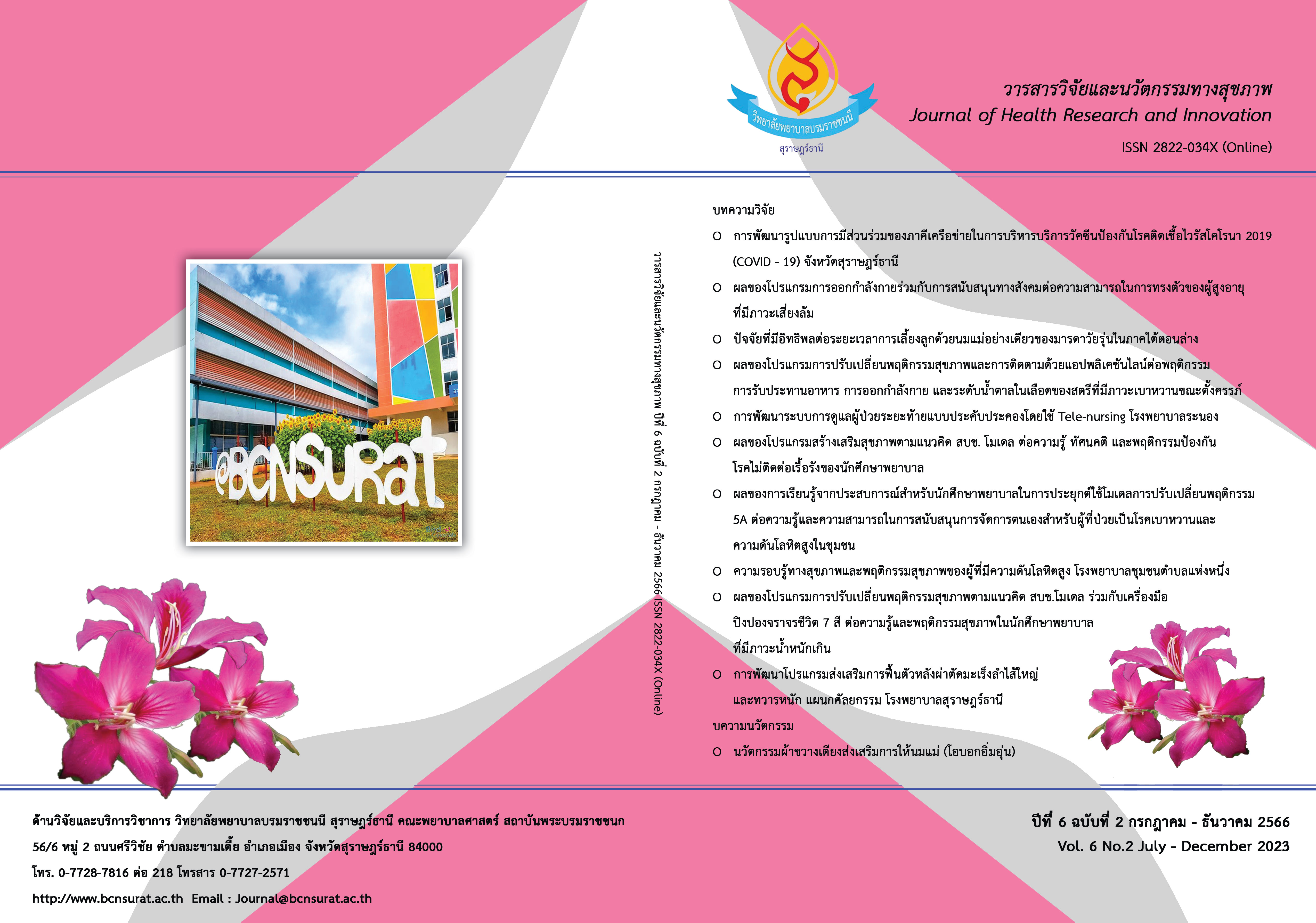ปัจจัยที่มีอิทธิพลต่อระยะเวลาการเลี้ยงลูกด้วยนมแม่อย่างเดียว ของมารดาวัยรุ่นในภาคใต้ตอนล่าง
คำสำคัญ:
ระยะเวลาการเลี้ยงลูกด้วยนมแม่อย่างเดียว, มารดาวัยรุ่นบทคัดย่อ
การศึกษาครั้งนี้ เป็นการวิจัยเชิงทำนาย มีวัตถุประสงค์เพื่อศึกษาระยะเวลาการเลี้ยงลูกด้วยนมแม่อย่างเดียวของมารดาวัยรุ่นในภาคใต้ตอนล่าง และอำนาจการทำนายของความรู้เกี่ยวกับประโยชน์ของนมแม่และวิธีการเลี้ยงลูกด้วยนมแม่ เจตคติ ความสำเร็จในการเลี้ยงลูกด้วยนมแม่ขณะอยู่โรงพยาบาล การสนับสนุนจากบุคคลในครอบครัว จากบุคลากรสุขภาพ ต่อระยะเวลาการเลี้ยงลูกด้วยนมแม่อย่างเดียวในมารดาวัยรุ่นภาคใต้ตอนล่าง กลุ่มตัวอย่าง คือ มารดาวัยรุ่นคลอดปกติและมีลูกอายุระหว่าง 2 ปี-2 ปี 6 เดือน จำนวน 100 ราย เครื่องมือในการเก็บรวบรวมข้อมูล ได้แก่ 1) แบบสอบถามข้อมูลส่วนบุคคล 2) แบบสอบถามระยะเวลาการเลี้ยงลูกด้วยนมแม่อย่างเดียวของมารดาวัยรุ่น 3) แบบสอบถามความรู้เกี่ยวกับประโยชน์ของนมแม่และวิธีการเลี้ยงลูกด้วยนมแม่ 4) แบบสอบถามเจตคติในการเลี้ยงลูกด้วยนมแม่ 5) แบบสอบถามความสำเร็จในการเลี้ยงลูกด้วยนมแม่ขณะอยู่โรงพยาบาล 6) แบบสอบถามการสนับสนุนจากบุคคลในครอบครัว และ 7) แบบสอบถามการสนับสนุนจากบุคลากรทางสุขภาพ ตรวจสอบความตรงเชิงเนื้อหาโดย ผู้ทรงคุณวุฒิจำนวน 3 ท่าน ทดสอบค่าความเที่ยงของเครื่องมือชุดที่ 3 โดยใช้สูตรของคูเตอร์-ริชาร์ดสัน ได้ค่าความเที่ยงเท่ากับ .90 และทดสอบค่าความเที่ยงของเครื่องมือชุดที่ 4-7 โดยคำนวณหาค่าสัมประสิทธิ์แอลฟาของครอนบาค ได้ค่าความเที่ยงเท่ากับ .85, .80, .90, และ .93 ตามลำดับ วิเคราะห์ข้อมูลโดยใช้การแจกแจงความถี่ หาค่าร้อยละ ค่าเฉลี่ย ส่วนเบี่ยงเบนมาตรฐาน การวิเคราะห์ถดถอยพหุคูณผลการศึกษา พบว่า
1. ระยะเวลาการเลี้ยงลูกด้วยนมแม่อย่างเดียวของมารดามากที่สุดอยู่ที่ 3 เดือน จำนวน 39 ราย (ร้อยละ39) และน้อยที่สุดคือ 2 เดือน จำนวน 5 ราย (ร้อยละ5) มีระยะเวลาเฉลี่ย 3.89 เดือน (SD.= .98)
2. เจตคติในการเลี้ยงลูกด้วยนมแม่ (ß= .46, t=5.96, p<.01) ความสำเร็จในการเลี้ยงลูกด้วยนมแม่ขณะอยู่โรงพยาบาล (ß=.34, t=3.48, p<.01) และการสนับสนุนจากบุคคลในครอบครัว (ß= .20, t=2.12, p<.01) สามารถร่วมกันทำนายระยะเวลาการเลี้ยงลูกด้วยนมแม่ของมารดาวัยรุ่นได้ ร้อยละ 51 (R2= .511) อย่างมีนัยสำคัญทางสถิติ (F (5,94)=19.64, p<.01)
ผลการวิจัยครั้งนี้สามารถนำไปใช้เป็นข้อมูลพื้นฐานในการพัฒนารูปแบบการพยาบาลหรือโปรแกรมส่งเสริมระยะการเลี้ยงลูกด้วยนมแม่อย่างเดียวให้ยาวนานขึ้นโดยเฉพาะในมารดาวัยรุ่น
เอกสารอ้างอิง
Altuntas, N., Turkyilmaz, C., Yildiz, H., Kulali, F., Hirfanoglu, I., Onal, E., Ergenekon, E., Koc., E.& Atalay, Y. (2014). Validity and reliability of the infant breastfeeding assessment tool, the mother baby assessment tool, and the LATCH scoring system. Breastfeeding Medicine, 9(4), 191-195.
Chainok., L. (2015). Factors Influencing Breast Feeding Behaviors of Postpartum Adolescent Mothers in Maharat Nakhonratchasima Hospital. Suranaree University of Technology.
Chansiri, S., Phahuwatanakorn, W. & Yusamran, C. (2017). Influences of Breastfeeding Attitude, Subjective Norm, and Self-Efficacy on Intention to Exclusive Breastfeeding among Teenage Pregnant Women. Journal of Nursing Science. 35(4), 49-60. (In Thai)
Dewi, R. et al. (2017). Family support and exclusive breastfeeding among Yogyakarta mothers in employment. Asia Pacific Journal of Clinical Nutrition, 26(suppl 1), S31-S35. Doi: 10.6133/apjcn.062017.s8.
Intharueang, U., Rungruang, K., Prakoddee, R. & Chancham, K. (2021). Motivation for a 6 - month Exclusive Breastfeeding among Postpartum Mothers, Surin Hospital. Journal of Health Science Boromarajonani College of Nursing Sunpasitthiprasong. 5(2), 86-100.
Konyoo, K. (2020). Effectiveness of Maternal Role Attainment Enhancement Among Adolescent Mothers: A Systematic Review. Nursing Joural, 48(2), 204-215. (In Thai)
Lertsakornsiri, M., Saibae, S. & Charoenwoodhipong, S. (2018). The Effect of Nursing Model Integrated with Family Support and Empowerment on Breastfeeding in the First-time Teenage Postpartum Mothers. Journal of The Royal Thai Army Nurses.
(Supplement), 129-138.
Lorhhana, S., Sinsuksai, N. & Phahuwatanakorn, W. (2018). The Factors Influencing a Four Week Exclusive Breastfeeding Among First-Time Adolescent Mothers. Journal of Boromarajonani College of Nursing, Bangkok, 34(2), 36-47. (In Thai)
National Statistical Office of Thailand, 2562. Thailand multipleindicatorcluster survey 2019, final report. Bangkok: NSO, UNICEF;2020. 416 p.(in Thai)
Payakkaraung, S., Sangperm, P.,& Sangpermt, C. (2016). Breastfeeding Problem in Early Postpartum Period: Mother’s Experiences. Journal of Nursing Science. 34(3). 30-40.
Pereira, R. S. V., Oliveira, M. I. C. d., Andra, C. L. T. d., & Brito, A. d. S. (2017). Factores associados ao aleitamento materno exclusive : o papel do cuidado na atencao basica. Cadernos de Saude Publica, 26, 2343-54. Nonthaburi: PNS-Creation. Retrieved from https://dlibrary. Thaibreastfeeding.org/bitstream/handle/023548404.11/451/TBC-TNBC-2017-Processding.pdf?sequence=1
Plaichum, S., Tongswas, T. & Somboon., L. (2012). Factors Related to Breastfeeding Duration among Adolescent Mothers. Nursing Journal. 39(2), 79-86.
Plodpluang, U., Srichan, A. & Kaewpraphan, S. (2016). Effect of Breastfeeding Promotion Based on Familial Support Program to Knowledge, Attitude and Attitude and Behavior of Postpartum Mothers and Family’s Member. Phranakhon Rajabhat
Research Journal (Science and Technology). 11(2), 41-52. (In Thai)
Rojphalakorn-Good., P. & Rucha, Y. (2013). Statistics for Nursing Research and using SPSS for windows. Bangkok: Judtong.
Rueangseree, M. & Kankarn, W. (2019). The Study of Factors Predicting the Duration of Exclusive Breastfeeding in Adolescent Mothers Who Attended Service at Health Promoting Hospital in Ubonratchathani Provinc. Journal of Nursing and Health Care, 37(1), 195-204. (In Thai)
Saks, M., & Allsop, J. (2012). Researching health: Qualitative, quantitative and mixed Methods (2nd ed.). London: SAGE
Srisatidnarakul, B. (2012). Research Instrument Development and Quality Validation: Psychological Measurement Properties. Bangkok: Chulalongkorn University Printing House. (In Thai)
Sunanta, S., Yusamran, C. & Phahuwatanakorn, W. (2016). Effect of Providing Knowledge and Support Primiparous Adolescent Mother and Grandmother on Maternal Role Attainment. Journal of The Royal Thai Army Nurses. 17(2). 125-134.
Thorndike, R, M. (1978). Correlation Procedures for Research, New York: Gardner Press.
Vanichbuncha, K. & Vanichbuncha, T. (2017). Using SPSS for windows to analyze data.Bangkok: Samlada. (In Thai)
World Health Organization. (2021). Protecting, promoting, and supporting breastfeeding in facilities providing maternity and newborn services: The revised Baby-friendly Hospital Initiative. from https://www.who.int/nutrition/publications/infantfeeding/bfhiimplementation-2021.pdf
World Health Organization. (2019). Adolescence is a time of opportunity during which a range of actions can be taken to set the stage for healthy adulthood. from https://apps.who.int/iris/bitstream/handle/10665/329883/WHO-RHR-19.15-eng.pd
Yilmaz, E., Ocal, F. D., Yilmaz, Z. V., Ceyhan, M., Kara, O. F., Kucukozkan, T. (2017). Early initiation and exclusive breastfeeding: factors influencing the attitudes of mothers who gave birth in baby-friendly hospital. Turkish Journal Of Obstetrics And Gynecology, 14, 1-9. doi: 10.4274/tjod.90018.
ดาวน์โหลด
เผยแพร่แล้ว
รูปแบบการอ้างอิง
ฉบับ
ประเภทบทความ
สัญญาอนุญาต
ลิขสิทธิ์ (c) 2023 วิทยาลัยพยาบาลบรมราชชนนี สุราษฎร์ธานี

อนุญาตภายใต้เงื่อนไข Creative Commons Attribution-NonCommercial-NoDerivatives 4.0 International License.
บทความที่ได้รับการตีพิมพ์เป็นลิขสิทธิ์ของวารสารวิทยาลัยพยาบาลบรมราชชนนี สุราษฎร์ธานี
ข้อความที่ปรากฏในบทความแต่ละเรื่องในวารสารวิชาการนี้เป็นความคิดเห็นส่วนตัวของผู้เขียนแต่ละท่านไม่เกี่ยวข้องกับวิทยาลัยพยาบาลบรมราชชนนี สุราษฎร์ธานี และคณาจารย์ท่านอื่นๆในวิทยาลัยฯ แต่อย่างใด ความรับผิดชอบองค์ประกอบทั้งหมดของบทความแต่ละเรื่องเป็นของผู้เขียนแต่ละท่าน หากมีความผิดพลาดใดๆ ผู้เขียนแต่ละท่านจะรับผิดชอบบทความของตนเองแต่ผู้เดียว



